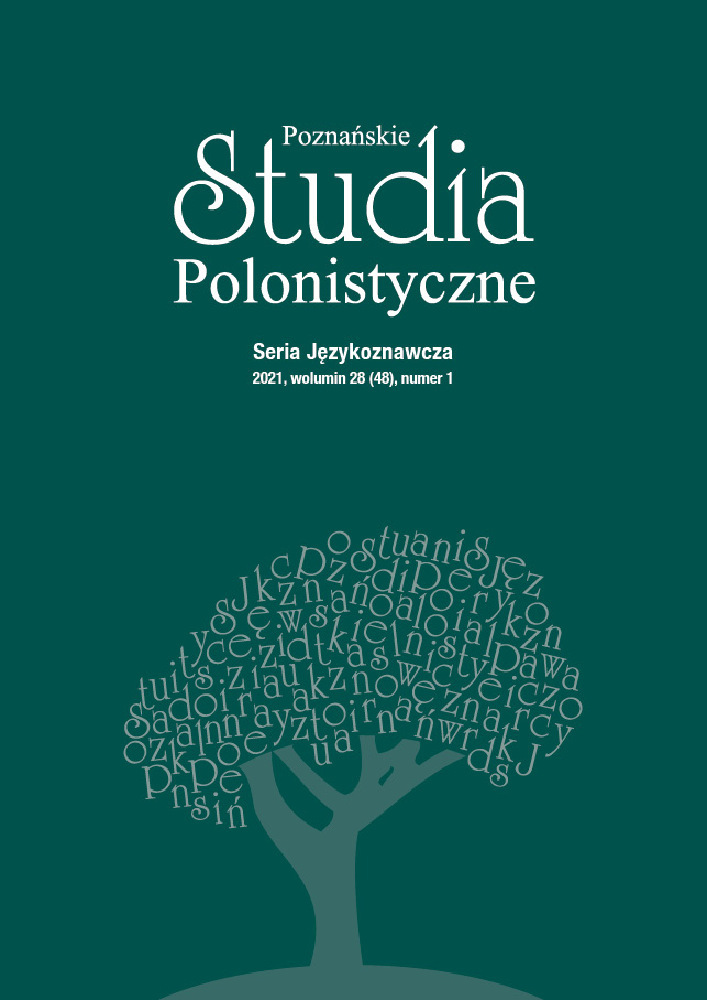Abstract
The aim of the article is to analyse forty-one official documents issued by three units of public administration: a voivodeship office, district office and district employment agency. The employees of the first of these have been striving for some time for a simplification and unification of documents, using the suggestions from linguists and sometimes resorting to their own intuition. In order to reach this goal, they have set up a set of rules that they believe make the text more intelligible to their addresses. The employees of the district office and the district employment agency have never made any significant changes to the way official documents are written and have more reservations about simplifying them. The documents discussed in the article will be evaluated in the context of plain Polish language advocated for by the members of the Plain Polish Workshop at the University of Wrocław. The main thesis of the text is the indication that modernising official documents in order to simplify and standardise them is a positive and needed action that benefits not only the addressee, but also the sender of the message.
References
Bartmiński Jan, Niebrzegowska-Bartmińska Stanisława (2009), Tekstologia, Warszawa.
Moroń Ewelina i in. (2015), Prosto o konkursach Funduszy Europejskich, Warszawa.
Piekot Tomasz, Maziarz Marek (2014), Styl „plain language” i przystępność języka publicznego jako nowy kierunek w polskiej polityce językowej, „Język a Kultura”, t. 24: Perswazja przez styl i stylizację, s. 307–324.
Piekot Tomasz, Zarzeczny Grzegorz, Moroń Ewelina (2015), Upraszczanie tekstu użytkowego jako (współ)działanie. Perspektywa prostej polszczyzny, w: Działania na tekście. Przekład – redagowanie – ilustrowanie, red. Stanisława Niebrzegowska-Bartmińska, Marta Nowosad-Bakalarczyk, Tomasz Piekot, Lublin, s. 99–116.
Piekot Tomasz, Zarzeczny Grzegorz, Moroń Ewelina (2017), Prosta polszczyzna w praktyce. Standaryzacja języka serwisu Obywatel.gov.pl, w: Przyszłość polszczyzny – polszczyzna przyszłości, red. Katarzyna Kłosińska, Rafał Zimny, War¬szawa, s. 251–265.
Piekot Tomasz, Zarzeczny Grzegorz, Moroń Ewelina (2019), Standard plain language w polskiej sferze publicznej, w: Lingwistyka kryminalistyczna. Teoria i praktyka, red. Monika Zaśko-Zielińska, Krzysztof Kredens, Wrocław, s. 197–214.
Poprawa Marcin (2012), Kancelaryjna rutyna czy niezamierzona propaganda? Roz¬mywanie się wzorców gatunkowych i stylistycznych we współczesnej komunikacji administracyjnej, w: Akty i gatunki mowy w perspektywie kulturowej, red. Anna Burzyńska-Kamieniecka, Wrocław (Język a Kultura, t. 23), s. 223–241.
Zarzeczny Grzegorz, Piekot Tomasz (2017), Przystępność tekstów urzędowych w inter¬necie, Wrocław.
Zdunkiewicz-Jedynak Dorota (2010), Wykłady ze stylistyki, Warszawa.
License
Authors
The Author declares that they are entitled to personal and property (material) copyrights to their work published in “Poznańskie Studia Polonistyczne. Seria Językoznawcza”, and that these rights are not limited by the terms of Author’s agreement. The Author warrants the originality, authorship, and sole ownership of all rights to the Work, and affirms that they have the right to grant all kinds of licenses hereinabove without infringing on the intellectual property rights of any third party, including personal rights.
The Author(s) retains copyright to their article and the right to freely dispose of the work, granting Adam Mickiewicz University in Poznań a non-exclusive, royalty-free licence under the Attribution-NoDerivatives 4.0 International (CC BY-ND 4.0) Creative Commons licence to use the Work without territorial restrictions for an indefinite period in the fields of use designated in the Author’s agreement.
Users
Interested Internet users are entitled to use works published in „Poznańskie Studia Polonistyczne. Seria Językoznawcza” since 2016 under the following conditions:
- attribution - obligation to provide, together with the distributed work, information about the authorship, title, source (link to the original work, DOI) and the license itself.
- no derivatives - the work must be preserved in its original form, without the author's consent it is not possible to distribute the modified work, such as translations, publications, etc.
Copyrights are reserved for all texts published before 2016.
Other
Adam Mickiewicz University in Poznań retains the right to the journal as a whole (including its layout, graphic design, title, cover design, logo and more).

